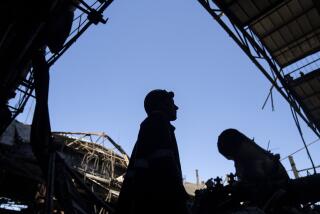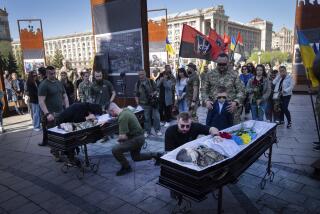Thousands Flee Soviet Disaster : Moscow Asks Sweden, W. Germany for Help
- Share via
MOSCOW — The Soviet Union said today that the nuclear accident at its giant power plant north of Kiev was a “disaster” and that thousands of people have been evacuated. The Soviets reported that only two people were dead, but an unconfirmed report said the death toll may have surpassed 2,000.
In Sweden and West Germany, nuclear energy officials said Soviet officials had asked for advice on how to put out an atomic fire, which is considered more disastrous than a reactor core meltdown. The European officials speculated that the reactor was burning out of control.
A government statement distributed by the official press agency Tass said the “radiation situation” at the Chernobyl plant was stable and that needed medical aid was administered.
The Kremlin slapped a security zone 20 miles in radius around the stricken plant. The Soviet statement said inhabitants in the surrounding zone, including three towns, had been evacuated. According to Soviet reference books, tens of thousands of people live in the affected zone, mainly in the town of Pripyat, a community of 25,000 that was built for workers at the Chernobyl plant.
sh Travelers Prohibited
Travelers from Moscow were barred from entering the Ukrainian capital of Kiev, 60 miles south of the accident site, to check the reports.
The Soviet statement did not go into details about the accident but said it “resulted in the destruction of part of the structural elements of the building housing the reactor.”
The Soviet statement said two people were killed in the accident. But a Kiev resident who has close contacts with hospital and rescue officials told United Press International in a telephone interview that 80 people died immediately and about 2,000 people died on the way to hospitals.
“The whole October Hospital in Kiev is packed with people who suffer from radiation sickness,” the woman said.
It was not possible to immediately confirm the Kiev woman’s reports.
sh Burials Reported
A spokeswoman at October Hospital denied in a telephone interview the facility was treating people injured in the accident.
The woman in Kiev said, “The people were not buried in ordinary cemeteries but in the village of Pirogov, where radioactive wastes are usually buried.”
In Stockholm, Friedrich Reich of the Swedish nuclear inspection authority told Swedish radio: “They asked for advice on how to put out a reactor fire. It is probably the moderator that is on fire. It is a graphite-moderated reactor. Graphite burns like coal.”
Reich said he advised the Soviets to contact Britain, which he said had a graphite fire at its Windscale nuclear reactor in 1957.
In Bonn, West Germany, Manfred Petrowl, spokesman for the German Atom Forum, said a Soviet diplomat visited the forum’s office and asked how to fight a graphite fire.
Germany Offers Aid
The forum is not a government organization but a private association that advises West German industry on nuclear matters. The West German government also offered Moscow help, a West German Foreign Ministry spokesman said.
Walter Patterson, an independent U.S. nuclear consultant, said on NBC-TV’s “Today” show that a fire still burning would imply “there is still radioactivity spewing into the air from it.”
A brief broadcast over Radio Moscow today said a commission was set up to investigate the accident and that “efforts are being applied to eliminate the consequences of the accident and to help the victims.”
A Soviet Foreign Ministry spokesman warned that travel to Kiev might be dangerous, but reports from the city of 2.4 million indicated no disruptions.
One Western diplomat said it was impossible to assess the report of 2,000 people dead but said “the figure is in the ballpark of rumors coming from the Ukraine.”
Several Western embassies reported that Westerners had phoned from Kiev to say up to 3,000 people were dead but embassy spokesmen said they considered the reports rumors.
There were reports that drinking water had been contaminated. Residents of Kiev, capital of the Ukraine, said today that all bus service in the city was stopped so vehicles could be used to evacuate the accident area.
Poland, whose eastern border is the Soviet Ukraine, today banned the sale of milk from cows that feed on fresh grass and said infants and children in the northeast would be treated for possible radioactive contamination.
The nuclear accident sent the radioactive cloud drifting north from Chernobyl over Leningrad, the nation’s second largest city, and then on to Scandinavia, where nuclear power officials first learned of the accident inside the Soviet Union. Later, winds changed and the cloud passed over Poland and Czechoslovakia on its way back to the Soviet Union.
More to Read
Sign up for Essential California
The most important California stories and recommendations in your inbox every morning.
You may occasionally receive promotional content from the Los Angeles Times.












